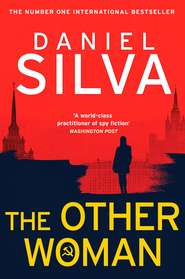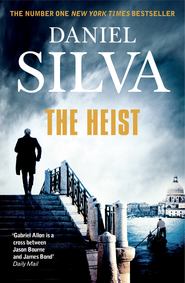По всем вопросам обращайтесь на: info@litportal.ru
(©) 2003-2024.
✖
The Black Widow
Настройки чтения
Размер шрифта
Высота строк
Поля
“The French don’t want money, Gabriel. The French want you.”
7 (#ulink_29c4349a-0753-5624-9040-a4af7af7ce0e)
MA’ALE HAHAMISHA, ISRAEL (#ulink_29c4349a-0753-5624-9040-a4af7af7ce0e)
NAVOT LAID A PHOTOGRAPH ON the table, a street in Beirut littered with the ancient debris of an antiquities gallery.
“I assume you saw this.”
Gabriel nodded slowly. He had read about Clovis Mansour’s death in the newspapers. Given the events in Paris, the bombing in Beirut had received only minor press coverage. Not a single news outlet attempted to link the two events, nor was there any suggestion in the media that Clovis Mansour was on the payroll of any foreign intelligence service. In point of fact, he received money from at least four: the CIA, MI6, the Jordanian GID, and the Office. Gabriel knew this because, in preparation for taking over as chief, he had been devouring briefing books on all current operations and assets.
“Clovis was one of our best sources in Beirut,” Navot was saying, “especially when it came to matters involving money. Lately, he’d been keeping an eye on ISIS’s involvement in the illicit antiquities trade, which is why he requested a crash meeting the day after the bomb exploded in Paris.”
“Who did you send?”
Navot answered.
“Since when is Mikhail an agent runner?”
Navot laid another photograph on the table. It had been taken by an overhead security camera and was of moderate quality. It showed two men sitting at a small round table. One was Clovis Mansour. As usual he was impeccably attired, but the man opposite looked as though he had borrowed clothing for the occasion. In the center of the table, resting on what appeared to be a swath of baize cloth, was a head, life-size, its eyes staring blankly into space. Gabriel recognized it as Roman in origin. He reckoned the poorly dressed man had more of the statue, perhaps the entire piece. The perfectly intact head was merely his calling card.
“There’s no date or time code.”
“It was the twenty-second of November, at four fifteen in the afternoon.”
“Who’s the chap with the Roman head?”
“His business card identified him as Iyad al-Hamzah.”
“Lebanese?”
“Syrian,” answered Navot. “Apparently, he rolled into town with a truckload of antiquities to sell—Greek, Roman, Persian, all high-quality, many bearing the telltale signs of recent excavation. Among the places he attempted to unload his wares was Gallerie Mansour. Clovis expressed interest in several items, but after making a few quiet inquiries he decided to take a pass.”
“Why?”
“Because the word on the street was that the gentleman from Syria was using the sale of looted antiquities to raise money for the Islamic State. Evidently, the money wasn’t intended for ISIS’s general fund. The Syrian gentleman was working on behalf of a high-ranking ISIS leader who was building a terror network capable of attacking targets in the West.”
“Does the ISIS leader have a name?”
“They call him Saladin.”
Gabriel looked up from the photograph. “How grandiose.”
“I couldn’t agree more.”
“I don’t suppose Clovis managed to learn his real name?”
“No such luck.”
“Where’s he from?”
“The senior ISIS commanders are all Iraqis. They regard the Syrians as pack mules.”
Gabriel looked down at the photograph again. “Why didn’t Clovis tell us about this sooner?”
“It seems to have slipped his mind.”
“Or maybe he’s lying.”
“Clovis Mansour? Lying? How could you suggest such a thing?”
“He’s a Lebanese antiquities dealer.”
“What’s your theory?” asked Navot.
“I have a feeling Clovis made a great deal of money selling those antiquities. And when a bomb exploded in the heart of Paris, he thought it might be wise to hedge his bets. So he came to us with a pretty story about how he was too virtuous to deal with the likes of ISIS.”
“That pretty story,” said Navot, “cost Clovis his life.”
“How do you know?”
“Because they killed Sami Haddad, too. I’ll spare you the photo.”
“Why just Clovis and Sami? Why not Mikhail, too?”
“I’ve been asking myself the same question.”
“And?”
“I don’t know why. I’m just glad they didn’t kill him. It would have ruined my going-away party.”
Gabriel returned the photograph. “How much did you tell the French?”
“Enough to let them know that the plot against the Weinberg Center originated in the caliphate. They weren’t surprised. In fact, they were already well aware of the Syrian connection. Both of the attackers traveled there during the past year. One is a Frenchwoman of Algerian descent. Her male accomplice is a Belgian national from the Molenbeek district of Brussels.”
“Belgium? How shocking,” said Gabriel derisively.
Thousands of Muslims from France, Britain, and Germany had traveled to Syria to fight alongside ISIS, but tiny Belgium had earned the dubious distinction of being Western Europe’s largest per capita supplier of manpower to the Islamic caliphate.
“Where are they now?” asked Gabriel.
“In a few minutes the French interior minister is going to announce they’re back in Syria.”
“How did they get there?”
“Air France to Istanbul on borrowed passports.”
“But of course.” There was a silence. Finally, Gabriel asked, “What does this have to do with me, Uzi?”











